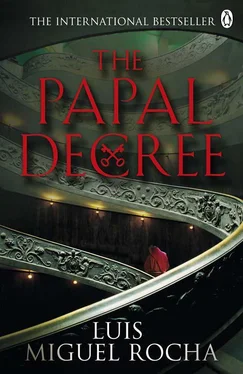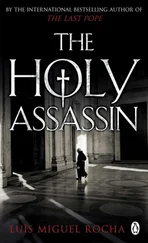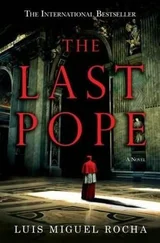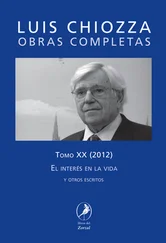Luis Rocha - Papal decree
Здесь есть возможность читать онлайн «Luis Rocha - Papal decree» весь текст электронной книги совершенно бесплатно (целиком полную версию без сокращений). В некоторых случаях можно слушать аудио, скачать через торрент в формате fb2 и присутствует краткое содержание. Жанр: Триллер, на английском языке. Описание произведения, (предисловие) а так же отзывы посетителей доступны на портале библиотеки ЛибКат.
- Название:Papal decree
- Автор:
- Жанр:
- Год:неизвестен
- ISBN:нет данных
- Рейтинг книги:4 / 5. Голосов: 1
-
Избранное:Добавить в избранное
- Отзывы:
-
Ваша оценка:
- 80
- 1
- 2
- 3
- 4
- 5
Papal decree: краткое содержание, описание и аннотация
Предлагаем к чтению аннотацию, описание, краткое содержание или предисловие (зависит от того, что написал сам автор книги «Papal decree»). Если вы не нашли необходимую информацию о книге — напишите в комментариях, мы постараемся отыскать её.
Papal decree — читать онлайн бесплатно полную книгу (весь текст) целиком
Ниже представлен текст книги, разбитый по страницам. Система сохранения места последней прочитанной страницы, позволяет с удобством читать онлайн бесплатно книгу «Papal decree», без необходимости каждый раз заново искать на чём Вы остановились. Поставьте закладку, и сможете в любой момент перейти на страницу, на которой закончили чтение.
Интервал:
Закладка:
‘On the other hand we’ll find out if he was one of the victims and if he’s trying to hide something. Either way we win.’
Barry thought a few moments. What would Rafael be doing in Paris with the Police Nationale? Was he being questioned by them? Had he died? When he came to himself again, he took out his personal cell phone and checked his contacts under the letter R. No number for Rafael. Strange. He knew he had his number and hadn’t deleted it. A CIA agent never deleted anything, since he never knew when he’d need it someday. Finally he remembered. He pressed J, and after several Jacks, Jack Payne appeared. He was listed under the name by which Barry had first known him. The bastard.
After a few seconds of hesitation, he pressed the green key and brought the phone to his ear. It started to ring. One ring, two, three. Pick up, pick up, he said to himself. Four rings, five, six, and… someone answered.
‘Rafael?’ he asked with a firm voice. He congratulated himself for having waited. It was he. ‘Hello. It’s David.’
Rafael said something David listened to carefully. ‘Yeah, we haven’t talked in a long time.’ More words neither Aris nor Samantha heard, since David hadn’t activated the speaker. ‘I’m in Rome,’ he lied, ‘and I thought of you. Are you free for coffee?’
A few seconds later Barry disconnected the call with a Perfect — I’ll see you there. He looked at Aris and Samantha.
‘He’s alive,’ Barry stated the obvious. ‘And he’s lying, too.’
‘What did he tell you?’ Aris wanted to know. Curiosity was an occupational hazard.
‘He was about to hear confessions at six, but we could have dinner at eight,’ he said as he left the office.
The others followed him.
‘Sam, I want you to check flights leaving Paris for Rome around five and see if Rafael is on any of them.’
‘He’s on one,’ Samantha guessed and left them.
‘Are we certain Rafael was in Paris this morning?’ Barry asked.
‘Absolutely. He’s on the manifest for Alitalia. The French confirmed this. He used his own passport.’
They went into a room crowded with monitors and agents carrying out surveillance on them. The various images were from satellite or closed-circuit video, covering different points all over the world. Barry saw Staughton, who was manipulating a joystick while also looking at a screen.
‘Staughton,’ Barry called.
‘Hi, David. To what do I owe the pleasure?’
‘Are you busy with something important?’
The monitor showed a woman talking on a cell phone on a busy street. She was carrying two shopping bags from Burberry. She was being filmed from above from a satellite four hundred miles high. Staughton zoomed out, and the monitor displayed the island of Britain.
‘Nothing that can’t wait,’ he answered.
‘I need to find the location of this number.’ Barry showed him the screen of his cell phone.
Staughton pressed a key that focused on the number. He rapidly dialed some keys and entered the number. He continued to send orders with impressive speed.
‘Are you kidding me?’ Staughton asked as he read the information that appeared on another monitor, along with a photo of Rafael, aka Jack Payne.
‘Do you know him?’ Aris asked.
‘Everyone knows Rafael. He gave me a lot of trouble.’ He also didn’t want to say a few ugly bruises. ‘When Barnes died he was there, too. He’s a tough son of a bitch.’
Barry knew the case. Rafael had nothing to do with the death of Geoffrey Barnes, Barry’s predecessor.
‘I need you to tell me where he is now.’
Moments later a red blinking signal appeared over a map on one of the screens.
‘He’s moving,’ Staughton informed him, continuing to strike the computer keys.
‘Where?’
‘In France. North of Paris, and taking off at high speed.’
The screen showed the red signal shifting toward the north on the map. Every time it blinked it shifted farther north.
‘Where is he? In a car?’ Aris asked.
‘No. He’s moving too fast.’
‘In a plane?’ Barry suggested.
‘We can’t pick up cell phone signals in a plane. Wait a minute,’ Staughton said, concentrating on his operations. A few moments later he left the keyboard and pressed the joystick: the image that hovered over the British Isles defined itself more and shifted to the south to focus on a long, narrow object moving very fast.
‘What’s that?’ asked Aris, who couldn’t see well.
‘The Eurostar,’ Staughton and Barry answered in unison.
28
The cherubim gave the room a kind of solemnity. There was one for every aesthetic taste, all probably commissioned to one artist, but produced by different pupils. There were the dandies, full of flowery details, with a shiny luster; the mischievous, who didn’t even try to hide their bad dispositions or, on closer analysis, their irritation; the indifferent, uncertain where they were looking, as if they could have been anywhere; others, with an austere expression, who confronted whoever looked at them; and then there was the one Hans Schmidt found most amusing, considering where it was placed. A small cherub, hovering over the prefect’s chair, was winking his eye, laying a finger over his lips to demand silence or, as Schmidt preferred to think, to warn him not to say anything incriminating. He made a mental note to find out who the artist of that piece was.
Hans Schmidt was calm, despite a sleepless night, thanks to the events that had tormented Tarcisio, which is to say that had tormented the church, but would not be alluded to in this hearing. The business here was something else, delicate also, but more personal, between the Apostolic Roman Catholic Church and Father Hans Schmidt — nothing so alarming that it could place the Roman Catholic world in crisis and bring down the Vatican like a house of cards. No. Here, the only person who could be ruined, if they desired, would be the Austrian iceman, though he appeared imperturbable.
Schmidt rose when the prefect of the congregation, in the person of Cardinal William, entered the hearing room accompanied by his court of jurors, though that term was never used. Secretary Ladaria followed him with five more counselors, the preferred title as Schmidt well knew. They all carried files and piles of papers. The Austrian knew very well that those learned, circumspect men had read his writings line by line and analyzed his books word by word so that nothing would escape. The congregation dedicated itself completely to its investigations.
As soon as the prefect sat down, the others followed his example, including Schmidt, who cast a complicit glance at the angel hovering over William’s chair.
‘Let us begin this hearing called by the prefect of the congregation in the name of the Holy Father Benedict XVI for the Reverend Father Hans Matthaus Schmidt regarding two of his publications, Jesus Is Life and The Man Who Never Existed,’ Secretary Ladaria, also a cardinal, proclaimed in a solemn but weak voice.
‘It is important to know that this is not a trial. No accusation has been made at this time,’ Cardinal William clarified. ‘The congregation has doubts about some of your writings and only wants to dispel these doubts. Understood?’
‘Perfectly, Most Reverend Prefect.’
‘I ask you kindly to respond to our doubts as best as you can. After the hearing, the congregation will decide if the ideas you advocate are damaging to the church or not.’
The rules and procedures understood, the prefect gave the floor to Monsignor Scicluna, a man whose wizened face looked a century old. Obviously he would have to be twenty years or more younger, since the positions consecrated to His Holiness required retirement at seventy-five without loss of honor and privileges. Even the servants of God are attacked by old age and senility. All are equal in the eyes of the Lord.
Читать дальшеИнтервал:
Закладка:
Похожие книги на «Papal decree»
Представляем Вашему вниманию похожие книги на «Papal decree» списком для выбора. Мы отобрали схожую по названию и смыслу литературу в надежде предоставить читателям больше вариантов отыскать новые, интересные, ещё непрочитанные произведения.
Обсуждение, отзывы о книге «Papal decree» и просто собственные мнения читателей. Оставьте ваши комментарии, напишите, что Вы думаете о произведении, его смысле или главных героях. Укажите что конкретно понравилось, а что нет, и почему Вы так считаете.












